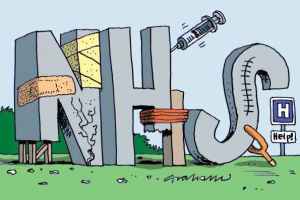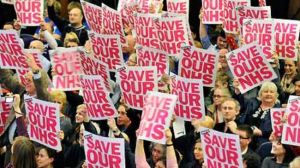Everywhere you look these days there’s news about the latest figures or reports that show what an unhealthy state Britain’s National Health Service is in.
According to The Independent the NHS ran a deficit of £500 million in the first 3 months of 2014. The head of NHS England says that in the next 5 years there is a £30 billion shortfall between what the health service needs, and the budget available to it.
Add to this the protests that have been taking place by members of the public and NHS workers, and it all adds up to something of a crisis.
So how could this possibly be a golden opportunity?
For those campaigns which focus on prevention rather than the cure, this is the time when they will be heard.
I’m talking specifically about organisations such as Drink Aware – who campaign for more responsible drinking habits. Articles keep surfacing about how much alcohol abuse is costing the NHS . One report says that alcohol misuse costs the NHS an estimated £3.5 billion each year.
The upcoming general election could be won and lost based on the parties’ NHS policy. All of a sudden every ear in Westminster is likely to be open to hearing about how a campaign to reduce alcohol misuse can help them deliver on their NHS promises.
Some campaigners are calling for moves such as implementing a minimum price per alcoholic unit, an end to happy hours, and cancelling or reducing the number of late licences given to bars.
In order to understand why these measures have not yet implemented, we need to do a quick power analysis (see here and here). Who or what are the powers that need to be influenced in order to change drinking habits?
Visible Power – The decision making mechanisms (in this case law makers, parliament).
Hidden Power – The behind the scenes shaping or influencing of the political agenda.
Invisible Power – Norms, beliefs, socialisation, ideology.
In this particular example we need to consider how hidden powers, such as alcohol brands and corporations, are affecting the visible power of the state legislators. Ending happy hours, reducing late licensing and introducing a minimum price per measure are all bad news for companies which sell or produce alcohol. So they will be strongly pressuring the government not to adopt these measures. Add to that the fact that the government makes so much money from taxing alcohol, and it’s easy to understand why the government would be unwilling to reduce the country’s alcohol consumption.
But with a general election now riding on the fate of the NHS, the opportunity cost of continuing down that path may be too strong. Political parties are falling over themselves to find a way to overturn that £30 billion NHS deficit. Now is the time when campaigners should be pushing the government to back a raft of healthy lifestyle measures – from reducing alcohol and cigarette consumption to healthier eating and exercise – because the only way for the state to afford the NHS might be to make sure that the population uses it less.
Even public opinion – shaped by the invisible power of socialisation and a country’s norms – might be more receptive to increased regulations on the alcohol industry and drinking behaviours if it means saving the much loved NHS.
With the upcoming election likely to be won or lost on NHS policy, campaigners must make the most of this opportunity for change.



Good post Simon! I suppose from now up until the general election we will see a lot more reporting on the NHS. It’s interesting that you’ve mentioned politicians will be failing over themselves to end the NHS’s 30 billion deficit, as I got a less positive picture. I find that politicians claim that they want to ‘save the NHS’, but the amount of negative coverage I read makes me feel otherwise. The daily express has run headlines describing NHS cuts as ‘putting your children in danger’, and the daily mail stated that ‘thousands are dying of thirst on NHS’. Perhaps the motive behind the constant coverage of the NHS deficit is less about improvements and more about a drive to privatisation. It would be interesting to think about whether or not the alcohol industry would be so keen to fund charities such as drink aware, if there was no pressure from the government to do so. If the government takes an ideology step back from providing health care, would they still provide so much funding and support to health awareness campaigns? definitely something to think about.
LikeLike